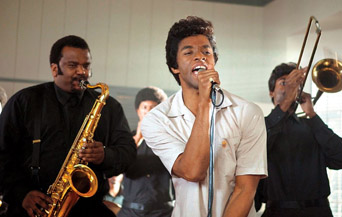The 400-Word-Review: Get On Up
By Sean Collier
August 4, 2014
BoxOfficeProphets.com

But it’s remarkable that all of that is in the film. The Hollywood biopic is a place where sins come to be washed away, faults are easily explained by childhood tragedy and Grammys conquer all. Where Walk the Line forced reconciliations and Ray glazed over indiscretions, Get On Up not only presents Brown’s flaws, but leads with them (the film opens with an aging Brown firing a shotgun into a roof, triggering a police chase).
That structure is a departure, too. Hollywood bios usually take one of two structures: a life-to-death summation (like Ray and Walk the Line,) or a single chapter of life writ into biographical metaphor (like Capote and Lincoln). Writers Jez and John-Henry Butterworth do a commendable job, making the seemingly obvious but practically bold choice of writing the best movie possible, floating back and forth in Brown’s life as the story suits. In the opening half-hour, we get glimpses of triumph, failure and childhood; the climactic scene jumps back 30 years to a pivotal moment in the early ’60s.
Less worthy of praise (but undeserving of criticism) is Taylor. While he’s gifted at recreating bygone eras with flair and verisimilitude, he falls back into a presentational mode for much of Get On Up, as he did in 2011’s The Help. It’s a workman’s job, but not distracting.
The simplest explanation for the film’s success, though, rests on the shoulders of Chadwick Boseman. The young actor, who transitioned from playing Jackie Robinson in last year’s 42 to taking on Brown, has a studious yet magical ability to give life to these iconic figures; in Get On Up, he moves like Brown, talks like Brown and seems as physically and equally emotionally comfortable giving life to the artist as an old man and as a teenager. (He isn’t tasked with singing like Brown, as recordings of the actual artist are used.) If performance like Jamie Foxx’s in Ray or Reese Witherspoon’s in Walk the Line are award-worthy, then Chadwick Boseman should clear space on his mantle.
My Rating: 9/10